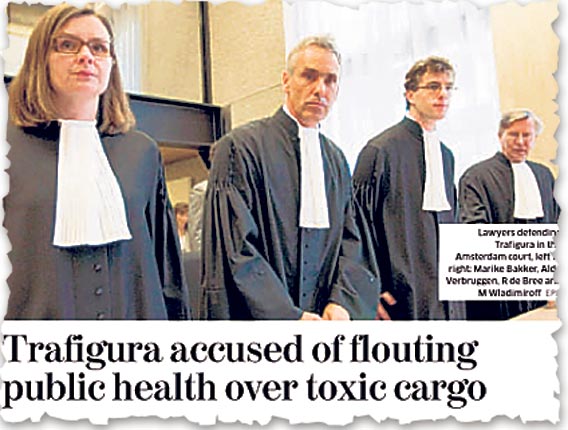Take toxic waste. Add caustic soda. Worry about the danger later
Cahal Milmo explains how a controversial company came unstuck in Amsterdam

Your support helps us to tell the story
This election is still a dead heat, according to most polls. In a fight with such wafer-thin margins, we need reporters on the ground talking to the people Trump and Harris are courting. Your support allows us to keep sending journalists to the story.
The Independent is trusted by 27 million Americans from across the entire political spectrum every month. Unlike many other quality news outlets, we choose not to lock you out of our reporting and analysis with paywalls. But quality journalism must still be paid for.
Help us keep bring these critical stories to light. Your support makes all the difference.
When the Panama-registered cargo tanker Probo Koala sailed into the port of Amsterdam on 2 July 2006, its arrival was just the latest stage in a quest for substantial profits from an oil deal spanning three continents.
For three months, the tanker chartered by Trafigura, a commodities trading multinational based in Switzerland, had been based in the Mediterranean as a sort of floating processing plant carrying out the purification of a cargo of low-grade gasoline known as coker naphtha bought from a Mexican refinery.
By adding caustic soda and a chemical catalyst to the cheap and sulphurous oil, it was "washed" to produce sellable petrol and slops containing a cocktail of water and chemical by-products – including foul-smelling compounds called mercaptans.
Trafigura points says "gasoline washing" is a common practice. What is less common is the use of a ship to carry out a process which, according to one of its own employees, was increasingly banned around the world because of the hazardous waste it produced.
The Dutch court published an internal company email from Naeem Ahmed, the Trafigura chemicals specialist who oversaw the washing process on board the Probo Koala from London. It said: "Caustic washes are banned by most countries due to the hazardous nature of the waste (mercaptans, phenols, smell) and suppliers of caustic are unwilling to dispose of the waste since there are not many facilities...."
The potential rewards for carrying out this process were substantial. Trafigura documents showed that the company, which last year made a profit of $1bn, expected to make £4m from each cargo of coker gasoline it purified.
When the Probo Koala docked at Amsterdam it was expecting to use the facilities of Amsterdam Port Services (APS), a Dutch waste disposal company with advanced facilities, to off-load the 544 cubic metres of slops it was carrying from its coker naphtha washings.
On the basis of the description of the waste as "oily tank washings including cargo residues" by the ship's captain, Sergiy Chertov, the disposal company had quoted a figure of €6,675 (£5,560) to deal with the residue.
But when an APS lighter began pumping some 250 cubic metres of the slops off the Probo Koala, it rapidly became clear that it was not what they had been expecting. APS told the company that it would cost substantially more – €400,000 – to process the waste, causing Trafigura to ask for the toxic sludge to be pumped back.
What followed was a three-day dispute between the oil company, APS and the Amsterdam municipal authorities over whether it was permissible under European waste regulations to return the waste to the Probo Koala.
Trafigura, which said the revised APS charges had been produced without "any credible justification", emerged victorious and the liquid was returned to the tanker. Dutch prosecutors said the reason for the oil company's reluctance to pay the revised figure was to protect its profits at the expense of the environment of a developing country.
The Probo Koala continued its voyage by visiting Estonia to pick up a cargo of unleaded petrol for delivery to Nigeria, where another unsuccessful attempt was made to find a waste disposal facility, before reaching the Ivory Coast.
On 20 August 2006, a fleet of trucks operated by Compagnie Tommy, a contractor in the Ivory Coast's commercial capital, Abidjan, fly-tipped the waste from the Probo Koala at 15 locations around the city, causing panic and "flu-like" symptoms among thousands of inhabitants. Trafigura says Tommy's "reprehensible and illegal" actions took place without its knowledge.
Luuk Boogert, the public prosecutor in Amsterdam, told the court: "The waste is dumped in a third-world country. Cheap, but with big risks for public health and the environment. The company saves €400,000." The company's defence lawyer in Amsterdam said it had been the victim of a "defamation campaign against Trafigura by environmental activists, journalists and politicians".
The dumping of the slops caused an international outcry which saw two Trafigura directors who had travelled to Ivory Coast to deal with the incident imprisoned for five months without trial and a deal eventually reached by the multinational to make a €152m (£126m) payment to the country's government. As part of the agreement, the Ivorians ended all civil legal action against the company.
In a statement yesterday, Trafigura said: "Concerning the delivery of dangerous goods, it is important that the court has noted that there was a limited risk to human health from these slops, and indeed no damage occurred in Amsterdam."
In Abidjan, campaigners declared a moral victory. Eliance Kouassi, president of the National Federation of Toxic Waste Victims, said: "Finally, Trafigura has been called out in a court of law. It's a real victory for us."
Subscribe to Independent Premium to bookmark this article
Want to bookmark your favourite articles and stories to read or reference later? Start your Independent Premium subscription today.
Join our commenting forum
Join thought-provoking conversations, follow other Independent readers and see their replies
Comments